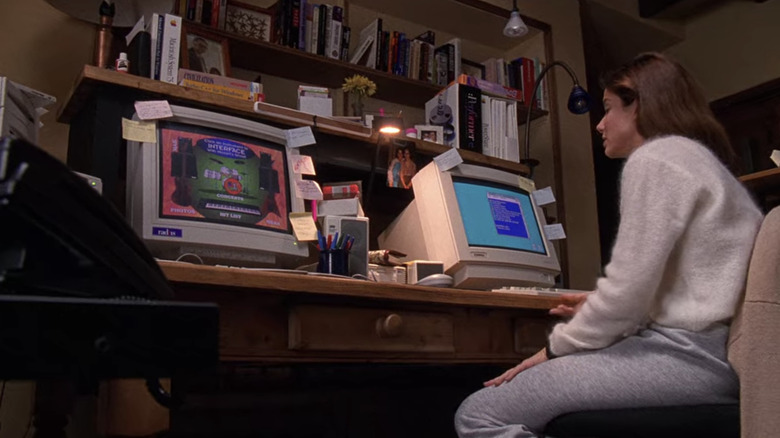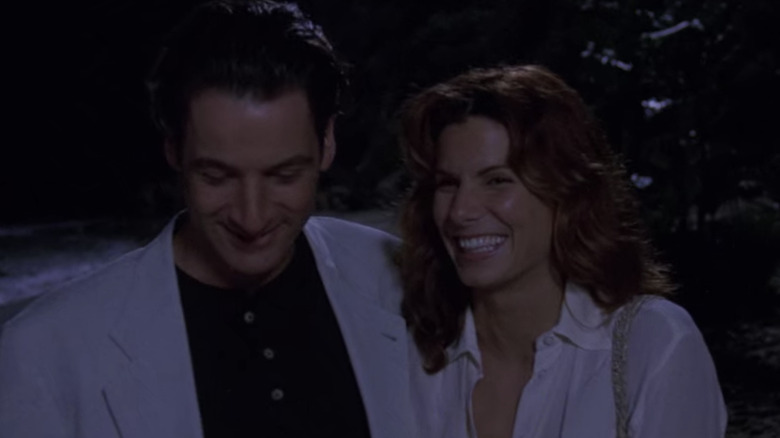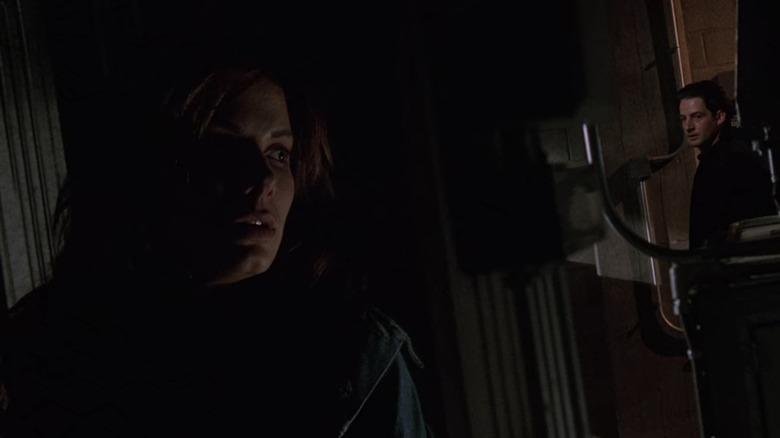The Ending Of The Net Explained
Sandra Bullock is one of the most successful actors still working today, known for starring roles in films that include "Speed," "Miss Congeniality," and "Bird Box." Her acting debut was in the 1987 thriller "Hangmen," and since then she's gone on to appear in everything from romantic comedies to science fiction thrillers. One of her earliest roles was in the thriller "The Net," which is blowing up on Netflix.
"The Net" stars Bullock as Angela Bennett, a computer programmer who spends most of her time working online and caring for her mother who has Alzheimer's disease. When Bennett finds herself in the middle of a conspiracy, the evil forces at work succeed in erasing her identity — and since few people have met her in person, Bennett doesn't seem to have many options left to save herself. With her immense computer knowledge and a few helpful figures, Bennett races to uncover the truth behind the conspiracy and clear her name, before it's too late.
As was the case with many films in the '90s, "The Net" paints an intense and at times horrific picture of the future of technology. With its many twists and turns, "The Net" keeps viewers on their toes throughout the film, though it may leave the end a bit confusing for those who miss crucial moments.
Here's the ending of "The Net" explained.
Angela's identity crisis
At the beginning of "The Net," Bennett receives a floppy disk (ah, the '90s) from her coworker with a mysterious webpage encrypted into the code. Later, she flies to Cancun, where she meets a charming man named Jack Devlin (Jeremy Northam), and the two end up spending some romantic moments together. Things quickly turn sour when Devlin reveals himself to be a bad guy after the floppy disk, and Bennett flees for her life only to get in a boat accident.
Bennett wakes up and realizes her identity has been erased and essentially replaced — her legal documents show that her name is Ruth Marx. The majority of the film then follows Bennett as she tries to uncover the truth, clear her name, and expose the masterminds behind the conspiracy.
While a thrilling plot in itself, the threat of having one's entire identity stolen or corrupted by cyberterrorists was a genuine fear in the mid-'90s, as the internet was getting more mainstream. Thankfully, Bennett is able to use her smarts and computer skills to outwit the bad guys and save herself by the end of the film, but the entire ride up to that point was a rollercoaster.
Few can be trusted
If there's one lesson you can take away from "The Net" — aside from being safe online and not opening unfamiliar files — it's that you can't really trust everyone you meet on the internet. At the beginning of the film, Bennett flirts in an online chatroom with a person with the alias Cyberbob, and he also comes up later in the film to give Bennett more information about the elusive hackers. Strangely, Devlin quotes Cyberbob after he and Bennett hook up on the yacht, and he also references Cyberbob when he tracks Bennett down at the pier. Is Cyberbob in cahoots with Devlin, or is Devlin somehow hacking into Cyberbob's computer? It's still unclear.
At one point in the film, Bennett is arrested by the California Highway Patrol. She's released with the help of her deceased friend's colleague, Special Agent Ben Phillips (Robert Gossett), who initially seems like he'll be genuinely helpful. As it turns out, he's a decoy for the real Ben Phillips and is in cahoots with Devlin, and Bennett escapes.
Bennett ultimately doesn't need much help once she uncovers the truth, and is able to trick Devlin into deleting the life-ruining malware on his own, thus clearing her name. At the very least, she learned a valuable lesson about trusting strangers.
Who's behind the conspiracy?
It takes a while to learn the truth behind the events of "The Net," but the reveal is worth the wait (and occasional confusion). While Devlin is the most obvious bad guy, he's not the one at the center of the conspiracy. In fact, he's a sort of hitman hired by the true bad guys, who are an underground hacker organization known as the Praetorians. The Praetorians are working with fellow bad guy Jeff Gregg (Gerald Berns), the CEO of Gregg Microsystems, which created the antivirus Gatekeeper — that we learned earlier in the film is implemented nationwide. As it turns out, the Praetorians use their malware to get into different computer systems, which Gregg then sells Gatekeeper to, and thus gains limitless access to their privileged information.
Once Bennett realizes the truth and that Gregg is behind the whole mess, she successfully copies the incriminating information onto a different floppy disk and mails it to the FBI. To top it all off, she tricks Devlin into reversing the damage the hackers did to her life, and she gains her identity back.



